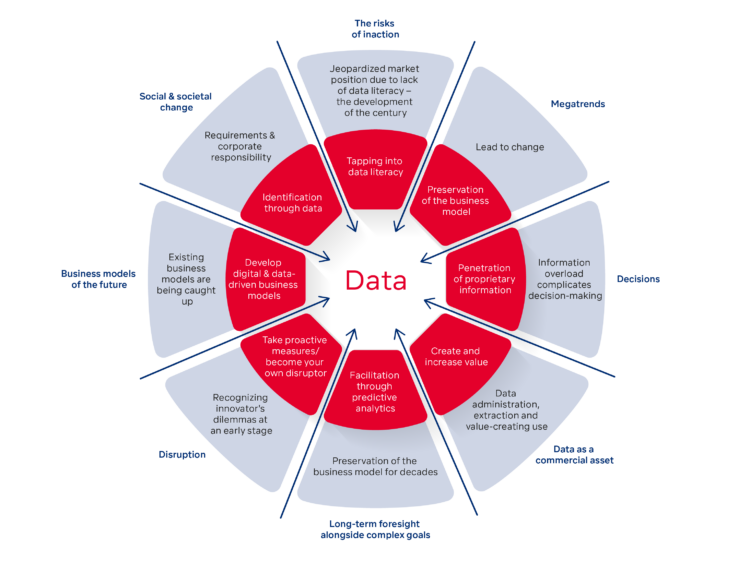
Why Data? – 8 approaches to the world of data
Many companies today are relying increasingly on digitization. The catch phrase “corporate data centricity” is often heard in this context: the aim of building one's own company on data along the entire value chain. But what does that actually mean? Why might it make sense to have a greater focus on data? Which aspects apply to the level of maturity of companies individually, irrespective of the industry? This article presents eight approaches to the extent to which data can be the solution to business challenges in the present and the future.
There is no one single approach or sole line of reasoning as to why data can be the foundation of future business development. Unlocking the arguments, discovering potential and opportunities, engaging in debate, and determining a company’s level of maturity are intricate processes. In order to get to grips with these preconditions, it is helpful to compare different approaches to data, digitization and their relevance to the individual company’s specific situation and mentality, as well as its own business objectives.

1. Disruption
There is always a risk that innovations will displace or replace a product, business model, service, etc. As a result, there is a risk that a disruptor will drive the corresponding company with this offering out of the market. In the classic innovator’s dilemma, participants who are currently successful in the market act rationally, but are actively driven out of the market precisely because of this.
Existing data must be used in the best possible way to ensure that there is early notice of the fact that a disruptor is threatening the market position and how it is doing so. Companies that adapt their business model, processes, products and services with foresight or become their own disruptor can escape the innovator’s dilemma.
2. Business models of the future
More and more companies are adopting a data-driven business strategy. As a result, direct competitors may be caught up sooner or later. Companies that want to counter this pressure of potentially being left behind can build the ability to develop digital and data-based business models and in doing so neatly dovetail their business strategy with a customized IT and data strategy.
3. Social & societal change
Social and societal change is boosting the importance of certain topics such as sustainability, climate protection & social responsibility. This also places demands and requirements on companies from end customers. Transforming a business into a data-driven company helps to identify these demands and respond to them appropriately. This allows these solutions to be made operational and therefore to fulfill the requirements of corporate responsibility in the present and the future, as well as the needs of customers.
4. The risks of inaction
The success of big tech companies is based on their ability to make the most of digitization and data. As a result, they are entering markets that are traditionally defined by other core competencies. This development could potentially jeopardize a company’s position in the market. Companies that fail to act expose themselves to the risk of being squeezed out of the market. In order to protect against this, it is advisable to go about proactively acquiring data literacy – the core competence of the 21st century.
5. Megatrends
There are matters and circumstances that affect all of humanity the world over, and by extension, one’s business – it is almost impossible to ignore them.
With data-based and data-driven measures, companies are able to respond and act in a way that creates value while maintaining integrity. These megatrends include climate change, demographic change, global value and supply chains, mobility and others.
The example of demographic change is a good illustration of the importance of data. In Germany, there will be significantly fewer workers in the labor market as the baby boomer generation retires; generally older populations increase the demands on many services and industries. Activities that are today strongly dominated by administrative staff will have to be replaced in the future due to a shortage of skilled workers. However, digitization has not yet progressed far enough to enable end-to-end or process automation, for example. That said, technologies such as machine learning already exist today and make it possible to make significant advances in automation in order to address the changing relationship between the labor market and the services that need to be provided.
6. Decision-making
Decision making happens on a spectrum ranging from gut decisions to fully data-driven decisions. For data-based decision-making, information is collected first. These are then refined into insights on the basis of which decisions can be made. The goal is usually to derive good actions by making well-founded decisions. In the modern age, we are exposed to a veritable flood of information, with both the complexity and the quality of the information fluctuating greatly. The process of making data-based decisions and the actions derived from them therefore also requires corresponding data competence: the ability to dig through a company’s own data as well as to manage the data in order to gain insights and make decisions in the first place. This is the only way to link them logically and contextualize them.
7. Data as a new commercial asset
Data themselves have value, so they are not just a means to an end. The value of these data lies, for example, in the potential for customization in the form of a personalized user experience: knowing a lot about a company’s customers increases the value of the corresponding data, including in terms of the actual profit creation of the company’s business model. Anyone who wants to leverage this value must
a) cultivate data
b) acquire more data
c) use those data to create value.
Data have always existed and been the basis for business success; today, however, the whole economic system is increasingly data-driven; the data themselves are becoming more valuable and expensive, they are being traded, and specific regulation is emerging to guide this trade, such as the EU directive on digitalization.
8. Long-term foresight alongside complex goals
In order to ensure that their business model will still function and be in demand in the next 10, 30 or 50 years, companies must adapt to new developments and requirements. Forecasting, long-term planning and developing future-proof solutions is easier and more effective using information that is already available, combined with knowledge that emerges from change. With the appropriate data expertise, these companies can act with foresight, for instance by tracking the behavior of customers and thereby reacting to demand and needs in a constantly new and flexible way. This also allows complex goals to be pursued, such as those where sales success only occurs after many touchpoints.
How do these approaches fit in with your business?
Data can be the answer to sustainable and future-proof value creation. Several of these approaches can suit you, your company; lines of reasoning can be interlocked and overlap; depending on the industry or business model, aspects may be missing or need to be adapted. We can support you in identifying your specific level of digital maturity and work with you to develop measures to adjust key parameters so that you can achieve corporate data centricity at all levels.
Are you interested in data-driven business management? If so, get in touch with Dr. Robert Fischer and his team and find out how you can generate a package of short- and long-term measures for your data-based business security based on your approaches.
